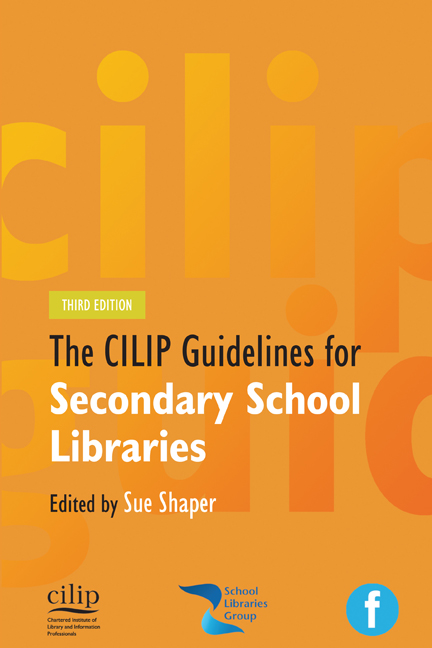Book contents
- Frontmatter
- Contents
- Foreword
- Key recommendations
- Introduction
- Notes
- Abbreviations
- 1 The school librarian and learning: CILIP's vision
- 2 Staffing and management
- 3 Policies and planning
- 4 The library environment
- 5 Management of learning resources
- 6 Information literacy
- 7 Developing students as readers
- 8 Marketing, promotion and advocacy
- 9 Evaluation
- 10 Partnerships
- References
- Appendices
- Index
6 - Information literacy
Published online by Cambridge University Press: 08 June 2018
- Frontmatter
- Contents
- Foreword
- Key recommendations
- Introduction
- Notes
- Abbreviations
- 1 The school librarian and learning: CILIP's vision
- 2 Staffing and management
- 3 Policies and planning
- 4 The library environment
- 5 Management of learning resources
- 6 Information literacy
- 7 Developing students as readers
- 8 Marketing, promotion and advocacy
- 9 Evaluation
- 10 Partnerships
- References
- Appendices
- Index
Summary
CILIP recommends that the librarian takes a lead role in the development of students’ information literacy skills to enable all students to become independent, lifelong learners. This means that:
• there is a whole-school approach to information literacy, with the librarian and all subject teachers using an agreed model and language
• information literacy skills are seen as important at every key stage, to establish good habits and develop higher level skills
• the school recognizes the librarian's professional expertise in information retrieval and knowledge of plagiarism issues and expects staff to collaborate in making best use of these.
Information literacy in the 21st century
The challenge that we face in the 21st century, more than ever before, is knowing how to satisfy our information needs with information that is reliable. Information literacy (IL) is a term used to encompass the skills and competencies that are required for navigating the information explosion that technology has unleashed. There are many challenges and decisions that are faced by consumers of information today. Information is available through an everincreasing range of media that can be accessed purposely or casually by browsing or by following links. There are many reasons that motivate individuals to find information, ranging from education and work to fun and entertainment. In addition, all consumers have to make ethical decisions about how they use the material that they find in relation to issues such as plagiarism and copyright (Webber, 2010). These components link together to form the why and how of 21stcentury informationseeking behaviour. With 24hour access to information sources this process of information consumption is ongoing. Information literacy skills cannot be ignored; they are an educational imperative and a ‘basic human right in a digital world’ which promote ‘social inclusion in all nations’ (IFLA, 2005). Figure 6.1 summarizes 21stcentury informationseeking behaviour.
Key information literacy definitions
Information literacy skills are recognized both nationally and internationally.
- Type
- Chapter
- Information
- CILIP Guidelines for Secondary School Libraries , pp. 45 - 60Publisher: FacetPrint publication year: 2014



